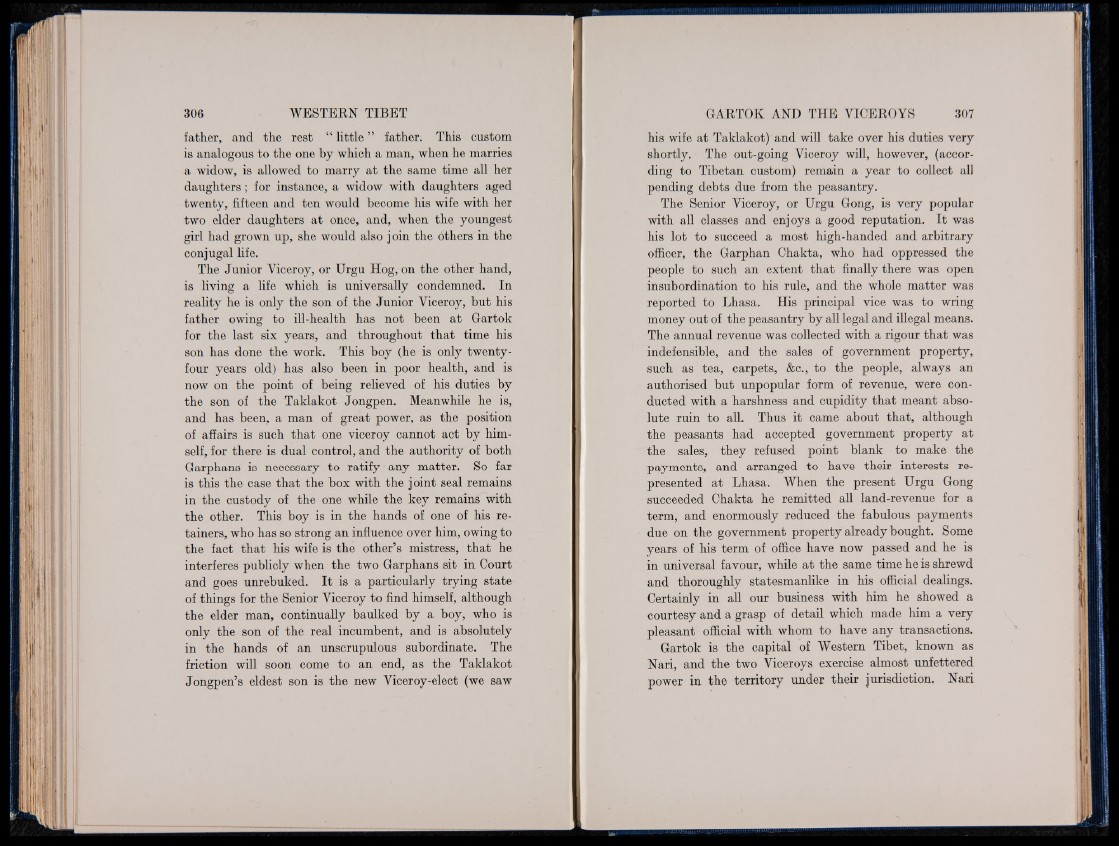
father, and the rest “ little ” father. This custom
is analogous to the one by which a man, when he marries
a widow, is allowed to marry at the same time all her
daughters; for instance, a widow with daughters aged
twenty, fifteen and ten would become his wife with her
two elder daughters at once, and, when the youngest
girl had grown up, she would also join the others in the
conjugal life.
The Junior Viceroy, or Urgu Hog, on the other hand,
is living a life which is universally condemned. In
reality he is only the son of the Junior Viceroy, but his
father owing to ill-health has not been at Gartok
for the last six years, and throughout that time his
son has done the work. This boy (he is only twenty-
four years old) has also been in poor health, and is
now on the point of being relieved of his duties by
the son of the Taklakot Jongpen. Meanwhile he is,
and has been, a man of great power, as the position
of affairs is such that one viceroy cannot act by himself,
for there is dual control, and the authority of both
Garphans is necessary to ratify any matter. So far
is this the case that the box with the joint seal remains
in the custody of the one while the key remains with
the other. This boy is in the hands of one of his retainers,
who has so strong an influence over him, owing to
the fact that his wife is the other’s mistress, that he
interferes publicly when the two Garphans sit in Court
and goes unrebuked. I t is a particularly trying state
of things for the Senior Viceroy to find himself, although
the elder man, continually baulked by a boy, who is
only the son of the real incumbent, and is absolutely
in the hands of an unscrupulous subordinate. The
friction will soon come to an end, as the Taklakot
Jongpen’s eldest son is the new Viceroy-elect (we saw
his wife at Taklakot) and will take over his duties very
shortly. The out-going Viceroy will, however, (according
to Tibetan custom) remain a year to collect all
pending debts due from the peasantry.
The Senior Viceroy, or Urgu Gong, is very popular
with all classes and enjoys a good reputation. It was
his lot to succeed a most high-handed and arbitrary
officer, the Garphan Chakta, who had oppressed the
people to such an extent that finally there was open
insubordination to his rule, and the whole matter was
reported to Lhasa. His principal vice was to wring
money out of the peasantry by all legal and illegal means.
The annual revenue was collected with a rigour that was
indefensible, and the sales of government property,
such as tea, carpets, &c., to the people, always an
authorised but unpopular form of revenue, were conducted
with a harshness and cupidity that meant absolute
ruin to all. Thus it came about that, although
the peasants had accepted government property at
the sales, they refused point blank to make the
payments, and arranged to have their interests represented
at Lhasa. When the present Urgu Gong
succeeded Chakta he remitted all land-revenue for a
term, and enormously reduced the fabulous payments
due on the government property already bought. Some
years of his term of office have now passed and he is
in universal favour, while at the same time he is shrewd
and thoroughly statesmanlike in his official dealings.
Certainly in all our business with him he showed a
courtesy and a grasp of detail which made him a very
pleasant official with whom to have any transactions.
Gartok is the capital of Western Tibet, known as
Nari, and the two Viceroys exercise almost unfettered
power in the territory under their jurisdiction, Nari